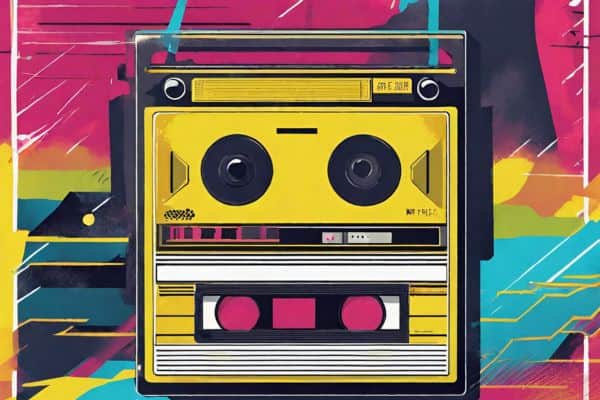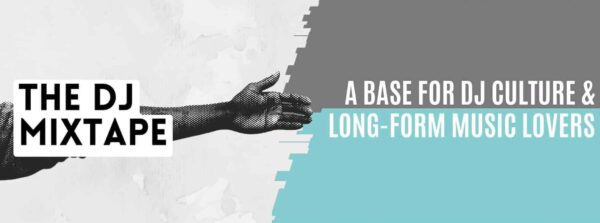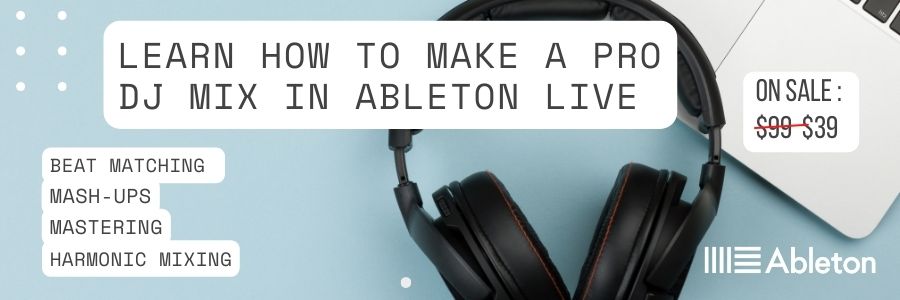Mixtapes have been a significant part of musical culture for decades, encompassing various genres and serving different purposes. From courtship tapes to break-up compilations, mixtapes have evolved over time to include a wide range of themes.
Tim Walker from The Independent once highlighted their diversity, even mentioning the “tape you thought was a courtship tape until she mentioned her boyfriend” type. These collections of carefully selected tracks have taken on many forms, such as walking tapes, summer tapes, dance party mixes, and the classic “showing off your collection to a new mate” tape.

In this guide, we approach mixtapes as we would create one – by curating content that people are likely to enjoy, weaving it together to tell a story, and sharing it with as many listeners as possible, or in this case, readers. This guide aims to provide a comprehensive insight into the burning question What is a Mixtape? and also more generally on mixtape and DJ culture, offering valuable insights and ideas.

What is a mixtape? – A Hybrid Art Form
But what exactly is a mixtape? Whether you think of it as a compilation of songs passed between friends on a cassette tape or a meticulously crafted deep house journey hosted on Mixcloud and shared online, the essence remains the same. Mixtapes embody common principles that define their nature:
- Hybridity: Mixtapes are a unique blend of composition and compilation, drawing elements from multiple sources, media, and timeframes. They often blur the lines between cultural consumption and production.
- Distribution: Unlike mainstream music, mixtapes are typically distributed through unconventional means. This includes personal exchanges, mail orders, downloads from non-corporate websites, purchases at live gigs, and sometimes even non-mainstream formats like cassette tapes.
- Intervention: The creator of a mixtape holds control over the recording process. They decide what the audience hears, manipulate sound beginnings and endings, overlay materials, and blend elements from diverse sources.
- Labor: Creating a mixtape demands an investment of labor, at least equivalent to the time needed to listen to it in its entirety. This effort distinguishes mixtapes from mere playlists or algorithmically generated mixes.
Mike Glennon, in his work for Sounding Out!, describes mixtape curation as an art, not a science. It’s a form of expression and storytelling that can take various shapes and evolve with time.

The Evolution of Mixtape Culture
The concept of mixtapes has evolved dramatically since the days of cassette tapes. In an article for The Federalist, Warren Henry shared insights into the methodology of creating a mixtape, both in the traditional sense and in today’s digital landscape. Regardless of the format, the core sentiments discussed can be applied to crafting contemporary DJ mixtapes on platforms like Ableton Live and creating nostalgic cassette compilations.
Mixtape culture is a reflection of our changing world. While some traditionalists argue in favor of handcrafted cassettes wound with care and compiled meticulously, new technologies have expanded the horizons of mixtapes. Today’s mixers can think beyond the limitations of physical formats and explore new structural options, enhancing their ability to create and sustain moods or messages within their mixes.

Bridging the Past and Present: The Mixtape’s Influence
Mixtape culture has played a pivotal role in shaping the music landscape, and it continues to evolve. From its early days in the 1980s to the present, mixtapes have gone through several phases:
- Early Days (1980s-1990s): The Golden Era of mixtapes featured pioneers like Ron G, Doo Wop, Kid Capri, and DJ Clue, who transformed mixtapes into platforms for exclusive content and new records.
- First Evolution (Mid 1990s – Early 2000s): The era before and after 50 Cent marked a shift in mixtape culture. Artists like 50 Cent began turning mixtapes into street albums, revolutionizing the industry.
- Street Album Evolution (2003 – 2007): Mixtapes took over demo tapes as artists focused on street credibility and sales, reshaping the industry.
- Blog Era Evolution (2005-2009): Blogs and websites started to replace traditional mixtape distribution, offering new music daily and shifting the mixtape landscape.
- Mixtape-As-Album Evolution (2009-2014): A new generation of artists like Big Sean, Kendrick Lamar, Drake, J. Cole, and Wiz Khalifa blurred the lines between mixtapes and albums, creating their own lanes.
- Streaming Evolution (2014-Present): Mixtapes have become big business in the digital age, providing artists with a platform to build their fan base independently.
Mixtape culture has come a long way, continually adapting to new technologies and audiences.

The Mixtape Dilemma: Ownership and Copyright
The concept of mixtapes has always had its share of controversies surrounding music ownership and copyright. In the 1980s, the slogan “HOME TAPING IS KILLING MUSIC!” raised concerns, much like the panic that emerged with Napster and the digital revolution in the early 2000s.
Copyright laws have had to evolve rapidly to address the changing landscape of music distribution. Brett Gaylor’s documentary, “RiP!: A Remix Manifesto,” explores copyright law’s impact on music creation in the digital age. It delves into the debate over whether re-appropriation of art is an ethical practice.
Cultural icons like Picasso and Andy Warhol have weighed in on the subject of appropriation in art. Steve Jobs famously said, “Good artists copy; great artists steal.” This idea resonates with today’s artists who engage in remixes and mash-ups, challenging the permanence of meaning ascribed to objects.
Technology has made copying and remixing easier, and the internet has become the world’s most efficient copying machine. The ability to create art with the intention of having it copied is essential for artists in the 21st century.

The Role of Spotify and Playlists
With the rise of digital music streaming platforms like Spotify, the question arises: What differentiates a mixtape from a playlist? Spotify has become a dominant force in the music industry, offering curated playlists as a central feature of its platform.
Spotify’s curated playlists, often created algorithmically, are designed for individual listeners, focusing on personalization. They replace the role of mixtape creators who crafted their mixes for others. The platform leverages user data extensively to deliver a personalized music experience.
While mixtapes were known for unexpected juxtapositions and sonic clashes, Spotify’s playlists aim for smooth transitions and professional beat-matching. The mixtape’s hybrid nature is homogenized in the world of playlists.

Mixtapes in the Streaming Era
Mixtape culture remains relevant in the streaming era. The recent streaming debut of Drake’s “So Far Gone” and Kehlani’s “While We Wait” illustrates the enduring significance of mixtapes. These formats, whether old or new, continue to influence music consumption and production.
In conclusion, mixtapes have evolved over the years, adapting to changing technologies and audiences. Their cultural significance remains strong, as they continue to shape the music industry and provide artists with unique platforms for creative expression.

FAQ – What is a mixtape?
What is a mixtape?
A mixtape is a curated collection of songs or tracks, often compiled by an individual or a DJ, with a specific theme or purpose in mind. It can be in the form of a physical cassette tape or a digital playlist.
How do mixtapes differ from playlists?
Mixtapes differ from playlists in that they are often carefully crafted to tell a story or create a specific mood. They may include elements like blending songs, overlaying material, and sequencing for a unique listening experience. Playlists, on the other hand, are often algorithmically generated and lack the personal touch of a mixtape.
What are some common themes for mixtapes?
Mixtapes can have various themes, including courtship, break-up, walking, summer vibes, dance parties, or simply showing off a collection of favorite songs. The themes are as diverse as the creators themselves.
How can I create my own mixtape or DJ mix?
Creating a mixtape or DJ mix involves selecting songs that fit your theme, arranging them in a specific order, and potentially adding transitions or effects. Software like Ableton Live is commonly used for digital DJ mixes. It’s a creative process that allows you to express your musical preferences and storytelling skills.
Are mixtapes still relevant in the digital streaming era?
Yes, mixtapes remain relevant in the digital streaming era. While platforms like Spotify offer curated playlists, mixtapes provide a more personal and artistic touch to music curation. They continue to shape music culture and are appreciated by listeners who value the unique experiences they offer.
What is the legal status of mixtapes and copyright?
The legal status of mixtapes can be complex. Mixing and distributing copyrighted music without proper licensing may infringe on copyright laws. However, some artists and labels may allow their music to be used in mixtapes for promotional purposes. It’s essential to be aware of copyright laws and seek proper permissions when creating and sharing mixtapes.
Can I sell my mixtape or DJ mix?
Selling mixtapes or DJ mixes may involve legal challenges, especially if the music included is copyrighted. It’s advisable to consult with legal experts and ensure you have the necessary licenses and permissions to sell mixtapes. Many artists and DJs offer mixtapes for free or promote them as promotional tools.
How has technology influenced the evolution of mixtape culture?
Technology has played a significant role in the evolution of mixtape culture. The shift from physical cassette tapes to digital formats has expanded the possibilities for mixtape creation and distribution. Digital audio workstations like Ableton Live have made it easier for DJs and enthusiasts to craft intricate mixes and reach a broader audience.
Are there any notable mixtape creators or artists known for mixtapes?
Yes, several notable DJs and artists are known for their mixtapes. DJ Clue, Kid Capri, and Ron G are pioneers of mixtape culture. Contemporary artists like Drake have also gained recognition for mixtapes, contributing to their popularity in the digital age.
Where can I find mixtapes and DJ mixes to listen to?
Mixtapes and DJ mixes can be found on various platforms. You can explore platforms like Mixcloud, SoundCloud, or even YouTube, where DJs and artists often share their creations. Additionally, some radio stations and music blogs offer mixtape collections for enthusiasts.
If you liked our post on What is a Mixtape? check out our article on The Avalanches, Since I left You. It’s part of our classic album review series.

Also, check our Youtube video on Making a Mashup in Ableton here:






